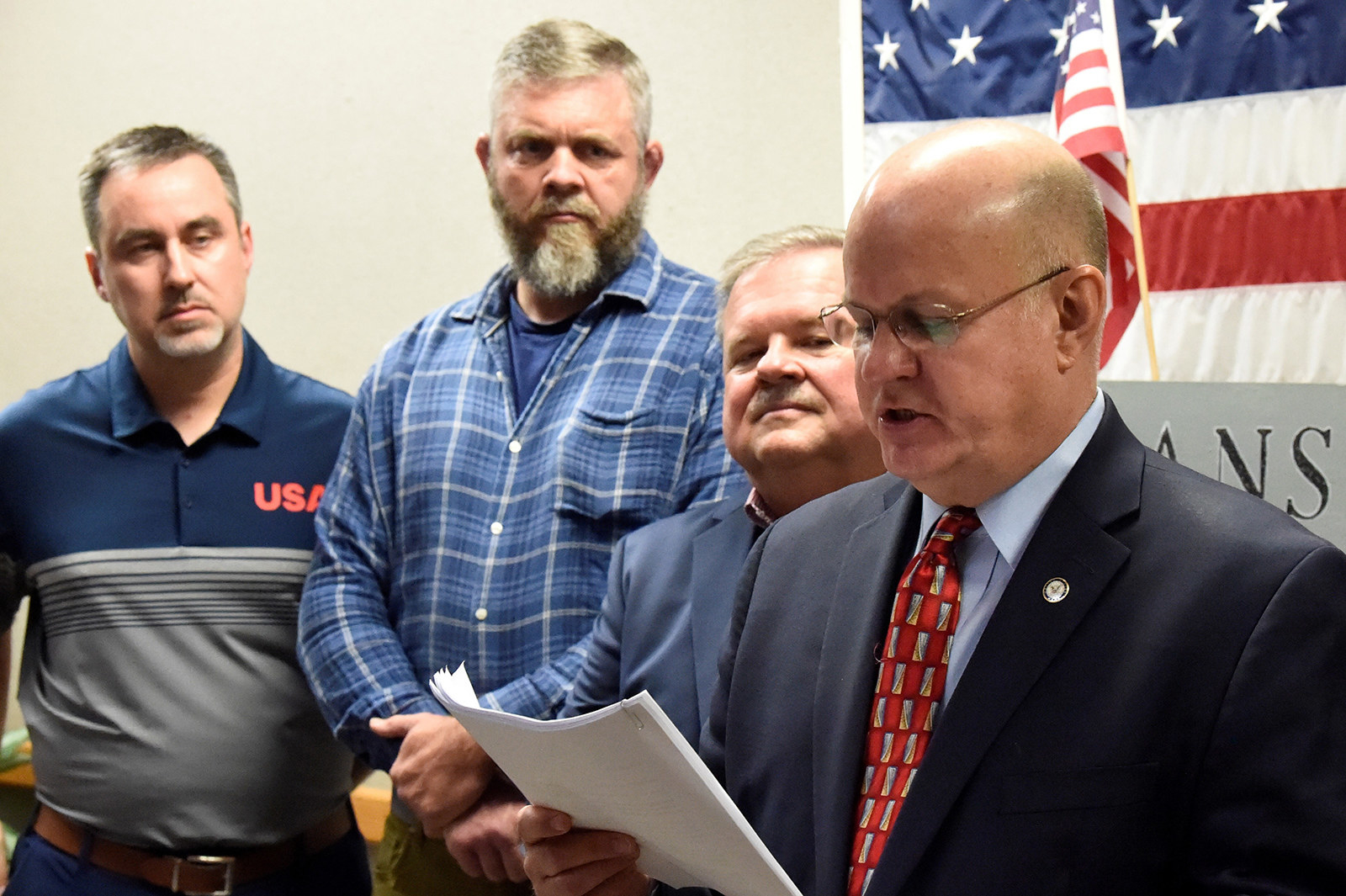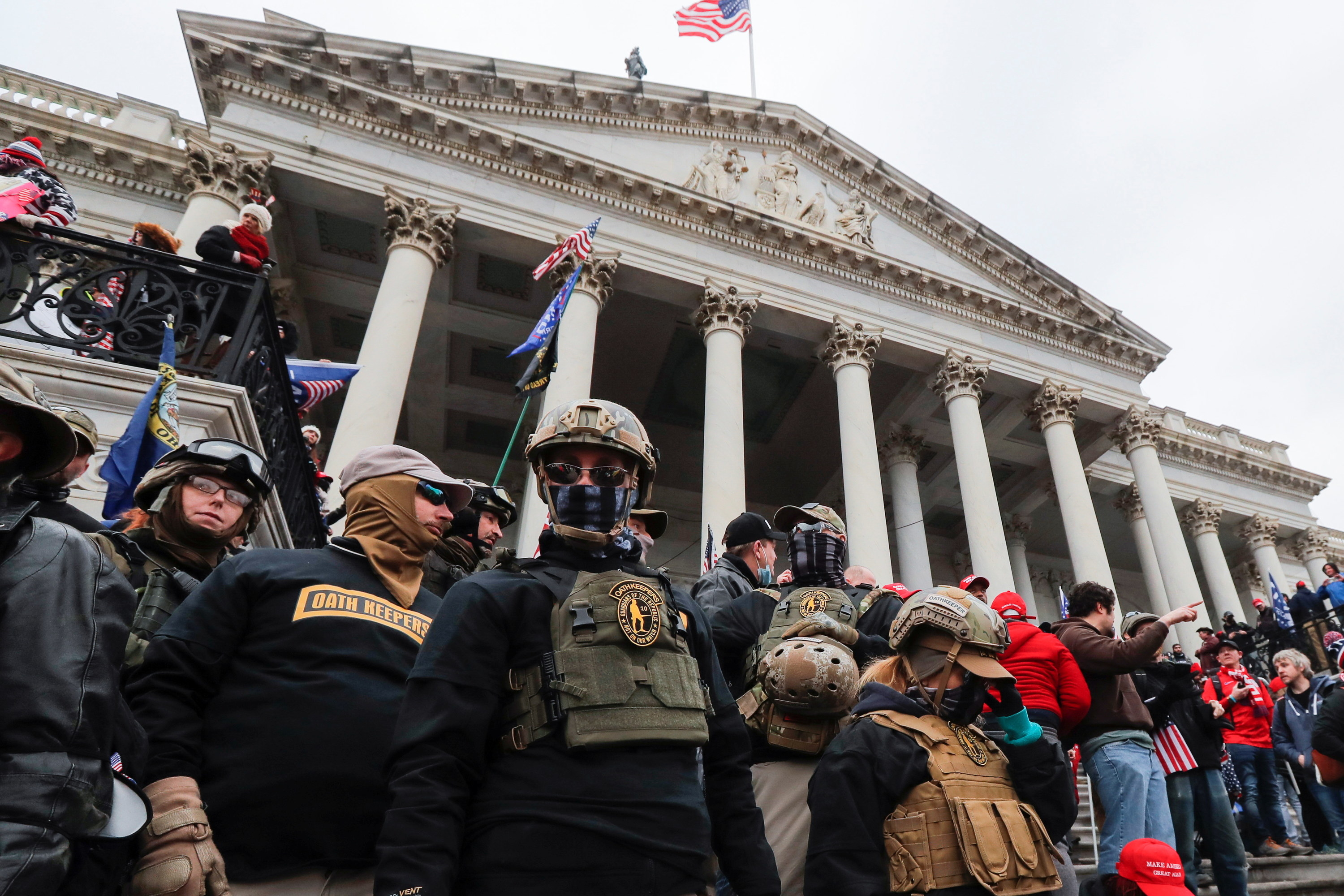
Despite an apparent surge in membership following the 2020 presidential election, the Oath Keepers are facing significant new obstacles to spreading their message and raising money since some of their members were arrested after the Jan. 6 Capitol riot. An examination of the militant group’s website by BuzzFeed News found a steep decline in the number of new member accounts registered since January.
The group gained widespread attention when a cluster of people, kitted out in tactical gear and the Oath Keepers insignia, were captured on video forming a military-style “stack” formation and forcing their way into the US Capitol building. More than a dozen individuals associated with the group have been charged in federal court with conspiring to block the certification of Joe Biden as president. If convicted, they could face years or even decades in prison.
Yet even with the public scrutiny and the voluminous government filings that the criminal cases have brought, little is known about the Oath Keepers’ finances or membership, which are tightly controlled by Stewart Rhodes, its founder and leader. Rhodes, who greeted other members of the Oath Keepers just outside the Capitol on Jan. 6 but did not enter the building, has not been charged with any crimes.
The Oath Keepers focus recruiting on members from the military and law enforcement, stressing that they owe loyalty to the US Constitution, to which they’ve sworn an oath, rather than their commanding officers or elected officials. The group relies on donations and annual dues but is not required to file public tax returns or publish membership lists, and even board members and leaders of local chapters say they are kept in the dark about key financial and operational details.
A BuzzFeed News review of leaked financial documents, membership data, state and federal corporate filings, and online fundraising appeals, however, opens a new window into how the organization operates and the way it has capitalized on moments of civil unrest across the US to recruit and raise money.
In their 12 years of existence, the Oath Keepers have grown to become one of the most prominent far-right organizations in the country, with close ties to politicians and members of law enforcement. Rhodes is a frequent guest on Alex Jones’ conspiratorial internet show, and the Oath Keepers have provided security to Trump allies, such as Roger Stone, as well as at high-profile events including the “Million MAGA March.”
More than 12,000 individual accounts labeled as “members” are publicly searchable on the Oath Keepers' website, according to BuzzFeed News’ analysis. The search results include usernames, some of which are members’ full names, and the month and year accounts were first registered. Some of those members may no longer be active; other members may be current but not visible because they did not register with the site. And the Oath Keepers’ website has experienced technical difficulties that the group says have affected the ability to sign up members online. The group has asked for applications to be sent by mail.
The listings, which include Rhodes and a number of other prominent members, suggest that at least 3,000 people joined the group in November and December last year, a period when Rhodes was a frequent guest on far-right media and at rallies calling for the election results to be overturned.
That spike appears to be by far the largest two-month increase in membership rolls in the last three years. January 2021 saw approximately 750 new registrations added to the website, although the listings do not indicate which accounts were registered on or before Jan. 6. But over February, March, and April 2021 — as some members of the Oath Keepers have faced legal consequences from the riot and the group faced a wave of negative publicity, deplatforming by social media companies, and bans by online payment processors — the website appears to have added fewer than 600 new members.

Rhodes did not respond to requests for comment. Court filings show he has been a focus of attention in the ongoing federal investigation, with prosecutors scrutinizing his communications before and after the Capitol insurgency. One member of the group, who pleaded guilty last month to obstructing an official proceeding and entering a restricted building with a deadly or dangerous weapon, is cooperating with authorities.
The apparent bump in membership in late 2020 was consistent with what has happened when the group got involved in other high-profile, politically charged showdowns. Over the years, current and former members say, Rhodes has repeatedly made a point of putting the organization front and center in such events, bringing it publicity and, in turn, new recruits and fresh donations, which he often solicits in press conferences, interviews, and online postings.
BuzzFeed News’ analysis suggests, for instance, that last June and July, as members of the Oath Keepers showed up to provide what they called “security” at Black Lives Matter protests in cities around the nation, the website gained more than 1,100 new registrations, compared to fewer than 200 over the same two-month period the prior year.
In April 2014, when a simmering dispute over grazing lands ended with cattle rancher Cliven Bundy in a standoff with federal law enforcement, Rhodes and a contingent of heavily armed members of the Oath Keepers rushed to southern Nevada to join the fray. He used the event to promote his group, holding press conferences and seeking donations online.
That provoked an apparent windfall. Leaked bank statements viewed by BuzzFeed News show that more than $100,000 was deposited to the Oath Keepers’ main checking account that month alone, a tenfold increase over the previous month’s final balance.
The group has never published a membership list. Local chapter leaders have complained that Rhodes has refused to share that information with them. As early as 2011, Rhodes claimed membership stood at 30,000, and by late 2014 it was widely reported to have risen to 35,000. The Anti-Defamation League, an advocacy group that tracks extremist organizations, disputes those figures, arguing that its membership is between 1,000 and 3,000, although it doesn’t provide any evidence to support that number.
The publicity following the Jan. 6 insurrection, however, does not seem to have produced the kind of boost the Oath Keepers have enjoyed in the past. Cut off by PayPal, Facebook, and Twitter, the group appears to be struggling to raise money and attract new recruits. A fundraiser launched in mid-March on GiveSendGo, a crowdfunding site that has hosted numerous right-wing causes that were banned elsewhere, has raised just over $15,000, far short of its $100,000 goal.
“We need your most generous support today!” reads an appeal linking to the fundraiser on the Oath Keepers’ website. “We are in a battle for the survival of the republic.”
Rhodes, an Army veteran who graduated from Yale Law School but was later disbarred, incorporated the Oath Keepers as a nonprofit organization in Nevada in 2009. There is no record, however, of the group ever receiving tax-exempt status from the IRS. That means it does not have to file public tax returns known as 990s that allow for outside scrutiny of charities’ fundraising and spending.
Because the Oath Keepers are not a tax-exempt organization, such as a 501(c)(3), donations aren’t tax deductible, and the group is not legally permitted to solicit charitable contributions. A fundraising appeal by Rhodes in December 2018 notes that “contributions to the Oath Keepers are not tax deductible.” But the majority of the group’s solicitations over the past several years make no mention of taxes at all, a review of the current and cached versions of the website shows, and it uses the .org domain commonly employed by charities.
It is unusual, although perfectly legal, for an entity to register as a nonprofit without also seeking tax-exempt status, tax experts say. But doing so would allow a group to maintain what Ellen Aprill, a Loyola Law School professor and expert on nonprofit tax law, calls the “halo effect”: being perceived as a charity without having to actually open its books.

Two years ago, Travel Smiles — a booking site that promises to donate a portion of fees to customers’ “favorite 501(c)(3) non-profit charity” — began listing the Oath Keepers alongside actual charities, including the Cancer Care Network Foundation and the Santa Fe Art Institute. The Oath Keepers’ website, in turn, promoted Travel Smiles.
The chair and CEO of Travel Smiles is Pressley Stutts, a South Carolina–based Navy veteran and vocal supporter of Donald Trump who promotes conspiracy theories and posted selfies with far-right personalities Alex Jones and Ali Alexander outside the US Capitol on Jan. 6. Stutts did not respond to messages seeking comment on his relationship with Oath Keepers.
The Oath Keepers’ tax status contrasts with several of its local chapters, which are independent of the national group.
Federal records show that the IRS has recognized at least seven local chapters of the Oath Keepers as tax-exempt organizations. Chapters in Virginia, Indiana, and Pennsylvania all file annual tax statements to the government, but none of them report revenue of over $50,000 and thus are not required to provide detailed information about their finances. Two chapters have had their tax-exempt status revoked for reasons that were not publicly specified.
Leaders of some chapters, as well as members of the Oath Keepers’ board, have complained that they are not privy to the finances of the organization and that Rhodes has refused to share funds or otherwise support local groups’ efforts.
A glimpse into the group’s financial operations came in 2017, when leaked recordings revealed that it had accused a contract employee, who was also a member of Oath Keepers, of embezzling thousands of dollars starting in 2013. The employee admitted to using the Oath Keepers’ PayPal account to buy a variety of items, such as computer equipment and gold and silver coins, which he then resold, keeping the proceeds for himself.

No charges were ever filed, and board members familiar with the incident said it was never reported to law enforcement.
“I know what this is about,” the contract employee told Rhodes on a phone call. “There’s no excuse for what I’ve done. I plan on paying back the transfers.”
Many members of the Oath Keepers’ board later said they were furious to learn of the embezzlement, which they suspected could have exceeded $200,000. They claimed Rhodes refused to divulge any details or bring in an outside accountant to investigate.
“We tried to look into that but could never get a straight answer,” a board member from that period, who asked not to be identified, told BuzzFeed News. “We never got any information on it.”
Several former insiders said they believe membership fees are the group’s main source of income. The organization currently charges $50 annually; its lifetime membership, normally $1,200, was recently put “on sale” for $1,000.
In the wake of Jan. 6, the Oath Keepers’ website lost its host, which took it offline for several days. Soon after the site found a new host, it included a message that noted, “We are manually processing your payments and memberships.”
Starting on March 16, a message, which is still there, was posted: “Due to all the malicious leftist attacks, our ability to take new memberships online is temporarily interrupted, but if you want to join Oath Keepers, you can mail in your application and dues.” The address it lists is a UPS Store in Granbury, Texas. Despite the complications, the listings include approximately 100 accounts added in April.
The site also directs would-be donors to a fundraiser on another website launched by Kellye SoRelle, the Texas attorney who gained attention in November for posting a video that purported to show voter fraud in Detroit but was later debunked. In January, she filed a lawsuit against every member of Congress, every sitting governor, and Mark Zuckerberg, among others, in an attempt to reverse the presidential election.
SoRelle, who was with Rhodes outside the Capitol on Jan. 6, has since appeared alongside him for several interviews on conservative websites. Since mid-March, she has been listed on the Oath Keepers’ site as the group’s general counsel. She practices law from an office located 2 miles from the Granbury UPS Store. She did not respond to requests for comment.
“Happy to contribute to a great patriotic organization!” wrote one anonymous donor who contributed $50 late last month.
To date, the fundraiser has brought in $15,432, or roughly 15% of its goal. ●



